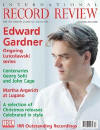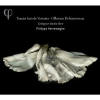Texte paru dans: / Appeared in:
*

International Record Review - (12/2012)
Pour
s'abonner / Subscription information
PHI
LPH005

5400439000056
Consultez toutes les évaluations recensées pour ce cd
~~~~ Reach all the evaluations located for this CD

At this year’s Utrecht Early Music Festival I was lucky enough to see, on successive nights, two of the great Bach conductors of the day, Maasaki Suzuki and Philippe Herreweghe, directing their celebrated ensembles. The contrast in conducting styles could hardly have been greatcr. Suzuki’s every gesture was controlled and precise, his direction fluent yet crisply articulated. With Herreweghe, I struggle to find a tactful way to describe how he appeared on stage. With his unruly hair and wearing a strange sort of Tolstoy smock, he looked rather like a kindly old hippy gesturing vaguely at the performers. Yet somehow his Collegium Vocale Gent knew exactly what he meant and sang with precision and exemplary beauty rather more so, indeed, than Suzuki’s Bach Collegium of Japan the night before. Collegium Vocale is currently celebrating its 40th anniversary, so its profound understanding of its founder’s and director’s musical wishes is unsurprising. Then again, Collegium Vocale is not so much a permanent choir as an ensemble of specialist Early Music singers. On this recording of Victoria choral music, for example, can be found such notable Baroque soloists as Hana Blažikova, Alex Potter, Hermann Oswald and Peter Kooij. However, there is no sense of an ad hoc group of vocal stars; rather the 13 singers are flawless in ensemble and finely controlled in the occasional solo passages.
Victoria’s Requiem Mass (Officium Defunctorum) for six voices is probaly his most famous work today. His masterpiece and his swansong, it has been performed on disc many times (memorably by the Choir of Westminster Cathedral and The Sixteen); but never, I believe, as well as this. In his booklet essay, Bruno Turner describes the work as having a simple dignity, and in the sublime ‘Offertory’, great bustling complexity and invention. The overall impression is of almost transcendent luminosity. Indeed ‘luminous’ is also the best word to describe the sound of Collegium Vocale in this recording. It should not be thought that the performance somehow floats across the surface in unruffled serenity; Herreweghe explores every inflection of Victoria’s score, including its restrained drama and grief transfigured by faith. The plainchant passages are sung with exceptional fluency and grace and thereby move seamlessly in and out of the surrounding polyphony. The singers’ diction is strikingly clear without seeming exaggerated; and even those with but hazy memories of school Latin (which includes me) should be able to follow most of the texts by ear.
This textual intelligibility is also a result of the deliberately transparent style Victoria assumed for the Requiem. In the four more thoroughly polyphonic motets that follow on this disc, it is not quite as easy to catch every word without recourse to the printed word. This selection of works gives but a glimpse at the riches of Victoria’s oeuvre and Collegium Vocale performs each with supple grace and, where appropriate, considerable vigour. The fame of this Requiem today and also his music for Holy Week may give a rather unbalanced impression of Victoria as a particularly sombre composer. These Eucharistic and Marian motets, which abound in both reverence and joy, are a useful corrective. In the heartfelt Salve regina I was struck by how well Herreweghe and his singers let us follow the Gregorian cantus firmus threading through the intricate part writing. The final motet on the disc, Vadam, et circuibo civitatem, is an early work; but it shows thrilling technical mastery in style that is at once rapturous and declamatory. Herreweghe and his singers perform it with passion and a sense of mounting excitement, which show that choirs which sing without Romantic exaggeration need not be cold and expressionless.
The recording, which was made in Notre Dame du Liban in Paris, has a glorious bloom to it, without any loss of detail. Bruno Turner, of Pro Cantione Antiqua fame, contributes detailed and very informative notes. (I must challenge one odd remark he makes to the effect that no one today finds credible the Judaic and Christian allegorical interpretations of the Song of Songs - a rather sweeping claim it seems to me.)
Philippe Herreweghe may have an eccentric conducting style to look at but he and his choir obviously understand each other and Victoria’s music at the deepest level. A masterly recording in every way.
Cliquez l'un ou l'autre
bouton pour découvrir bien d'autres critiques de CD
Click either button for many other reviews


